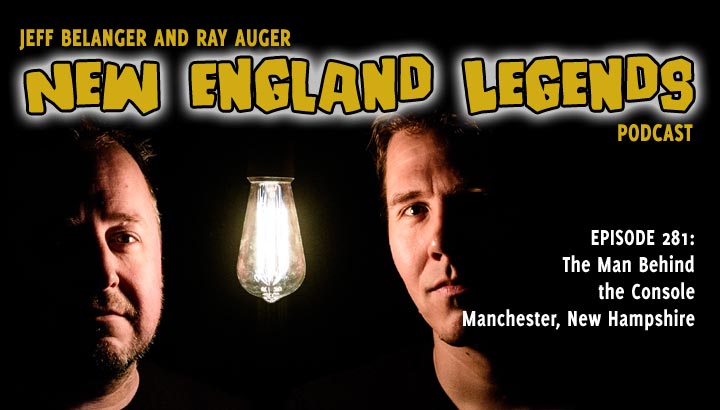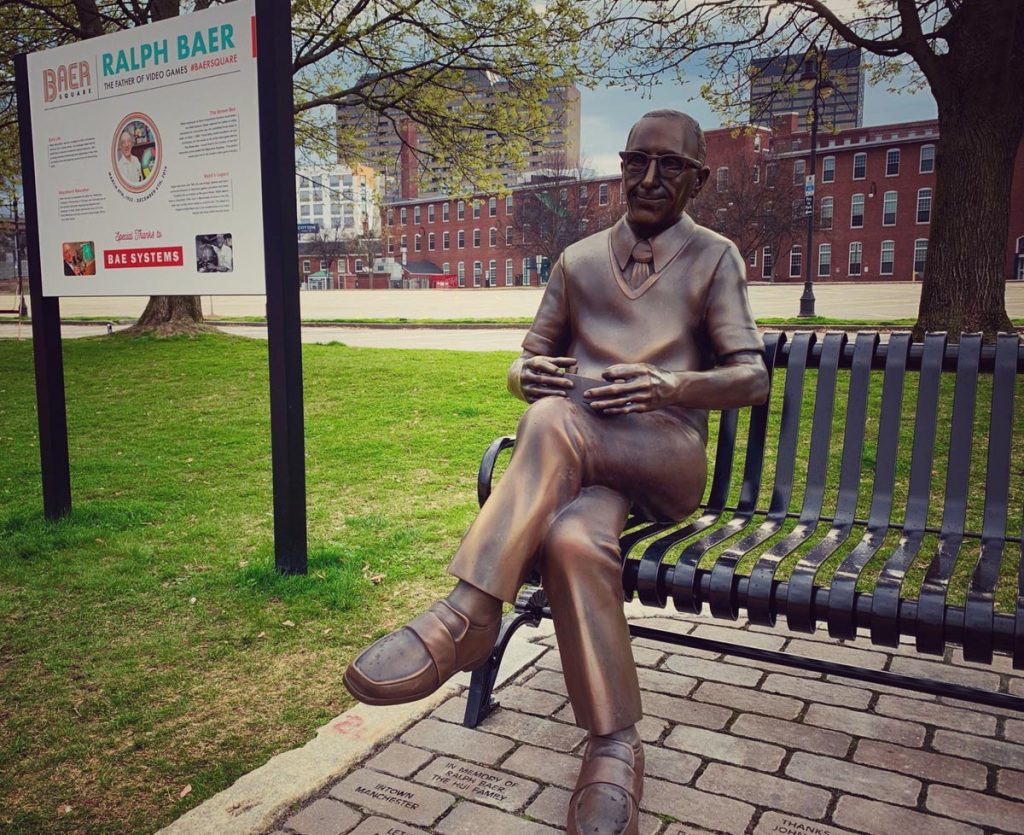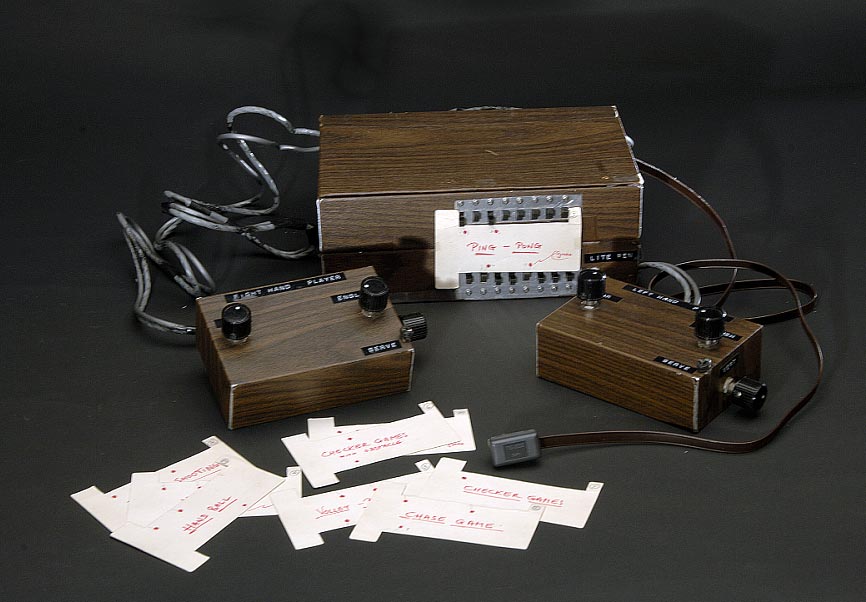

In Episode 281 Jeff Belanger and Ray Auger stroll Heritage Park in Manchester, New Hampshire, in search of the statue of a man sitting on a park bench holding a small box with dials on it. The statue depicts Ralph Baer, who changed the world back in 1966 when he developed the first home video game console. From two lines knocking a small digital square back-and-forth, a $220 billion dollar industry was born.
BECOME A LEGENDARY LISTENER PATRON:
https://www.patreon.com/NewEnglandLegends
CREDITS:
Produced and hosted by: Jeff Belanger and Ray Auger
Edited by: Ray Auger
Theme Music by: John Judd
SUBSCRIBE TO THE PODCAST FOR FREE:
Apple Podcasts/iTunes | Google Podcasts | Spotify | Pandora | Stitcher | Amazon Podcasts | TuneIn | iHeartRadio
JOIN OUR SUPER-SECRET:
New England Legends Facebook Group


EPISODE TRANSCRIPT:
*A note on the text: Please forgive punctuation, spelling, and grammar mistakes. Like us, the transcripts ain’t perfect.
[VIDEO GAME SOUNDS]
JEFF: Ray! Shoot that one. THAT ONE!
RAY: I’m trying! I’m trying!
JEFF: Double points. Come on!
RAY: Oooooo I’m gonna level up!
JEFF: 20 XP – open that chest. Over there! No NOT THERE!
RAY: WHERE?!
JEFF: There in the corner by the….
[GAME LOSING SOUNDS]
JEFF: Nevermind.
RAY: Maybe we should play a less stressful game. I don’t need to be breaking any toys in my man cave here in some fit of rage.
JEFF: Or… we could hop in the car and drive up to Manchester, New Hampshire, to sit with Ralph Baer — the faither of the home video game console.
[INTRO]
JEFF: Hello, I’m Jeff Belanger and Happy New Year! Welcome to Episode 281 of the New England Legends podcast.
RAY: And I’m Ray Auger, thank you for joining us on our mission to chronicle every legend in New England one story at a time. So many of our story leads come from you! We love when you reach out to us through our Web site or our super secret Facebook group to share your own local tales of ghosts, monsters, aliens, roadside oddities, and weird history. Please stay involved.
JEFF: Please do. Now, before we go searching for the man who sucked our lives away with countless hours of pixelated mayhem in Manchester, we want to take just a minute to tell you about our sponsor, Nuwati Herbals!
RAY: It’s a new year, and that means it’s time for resolutions.
JEFF: It is.
RAY: Time to trade in those expensive and sugary drive-through drinks for something more healthy, but still warm and satisfying.
JEFF: If you want to fight those food cravings as you work to eat better and exercise more, check out See Less O Me Tea from Nuwati Herbals.
RAY: See Less O Me is an herbal blend of all natural ingredients designed to make you the best version of you ever. This is the year you look and feel better and it all starts with what you put in your body. Be sure to treat it right!
JEFF: After the overdose of cookies and drinks this holiday season, I’m dealing with a major sugar crash. So I’ve been reaching for Wind Dancer Tea from Nuwati Herbals. It helps me keep my energy up the natural way, but it’s still a warm treat when I hit that afternoon slump.
RAY: Let Nuwati Herbals help support your healthy lifestyle. Check out the Nuwati Herbals Web site to see all of their great products AND you get 20% off your order when you use the promo code LEGENDS20 at checkout. Visit Nuwati Herbals dot com. That’s N-U-W-A-T-I Herbals with an S dot com.
JEFF: Okay, Ray… let’s hit the road for Manchester…
[CAR DOOR CLOSES DRIVING SOUNDS]
RAY: So I’ve played a few video games in my day.
JEFF: As have I.
RAY: I’m old enough to remember playing Pong in my friend’s basement as a kid.
JEFF: I’ve played Pong too! If these kids today could see those graphics…
RAY: They’d laugh and laugh.
JEFF: They would. Pong can’t hold a candle to Xbox, or Playstation. But at the time it was magic! Sitting in front of a television set and playing video games.
RAY: So much better than dumping quarter after quarter at the arcade.
JEFF: But back then, the home graphics weren’t nearly as good as the real arcade.
RAY: Sure, but any port in a storm, right?
JEFF: Right. Okay, we’ll make a right up here on to Stark Street.
[BLINKAH]
RAY: Got it.
JEFF: And we’ll pull into this huge parking lot. Try to get near that small park by the edge of the River.
RAY: Okay.
[CAR STOPS DOORS CLOSE]
JEFF: So this is Heritage Park.
RAY: It’s not very big at all. There are some steps leading down to the Merrimack River. Some trees. Just a few feet of grass and then Heritage Trail runs along side of the river–it’s basically a brick walkway. And I see a few park benches.
JEFF: Yup, that about sums up Heritage Park. We’re heading to that park bench over there.
RAY: You mean the one where that guy is sitting? Oh wait… that’s a statue.
JEFF: That’s the statue we’re looking for.
[WALKING]
RAY: So there’s a bronze man sitting on the edge of the bench. He’s got his legs crossed. His sleeves are rolled up and he’s wearing a shirt and tie underneath a sweater vest. He looks older, maybe in his 60s, and he’s wearing glasses. By all accounts he looks kind of… well… nerdy.
JEFF: He does! Check out what’s in his hands.
RAY: Oh yeah… I almost missed that. He’s holding a little box with some dials on it. It’s like an old-time game controller.
JEFF: This is the memorial statue to Ralph Baer. He’s considered the father of the home game console and it’s his fault we’ve wasted countless hours of our lives playing video games.
RAY: Well, thanks a lot, Ralph…
JEFF: To find out how he did it, and why this statue is here, let’s head back to 1966 and meet the man.
[TRANSITION]
RAY: It’s the winter of 1966. Lyndon B. Johnson is President of the United States, and The Beatles are on top of the music charts with their latest hit “We Can Work It Out.” The television show “Bonanza” is number one in ratings, and about a year ago, America began sending armed forces to Vietnam. It’s a troubled time, but also a time of innovation.
JEFF: Ralph Baer is working for a company called Sanders Associates in Nashua, New Hampshire. Ralph is an engineer and electronics whiz.
RAY: A little more about this electronics wizard. He was born in Germany in 1922. His family fled the Nazis just before World War II, and he came to American to help the allied war effort. When the war ended, he fell in love with this developing field of electronics.
JEFF: Baer is a tinkerer. He likes building things. And he has the ability to look at something everyone knows, and see possibilities of what it could be. In 1966, Baer began looking differently at…
[CLICK TV STATIC]
JEFF: The television.
RAY: Television is huge. Every U.S. household MUST have one… and they ain’t cheap. A new Zenith color television will set you back about $500.
JEFF: Television networks are vying for your attention with programs, news, sports, and anything else they think you’ll sit and watch. Consider this… here in 1966, 93% of American households have a television. Just 16 years ago… in 1950 that number was only 9%.
RAY: So it won’t be long before the number of U.S. households with a television will be just about 100%.
JEFF: Nope. TV is here to stay. It’s already replaced the radio for the place people go for entertainment and information. So Ralph Baer is looking at the television and wondering: What else can we do with this thing?
RAY: Back in October of 1958, Physicist William Higinbotham was working at Brookhaven National Laboratory. Higinbotham used an oscilloscope to create a novelty game where two lines could hit a digital ball like tennis. He made it for fun. They put it on display for Visitors Day at the laboratory and everyone was captivated with their game.
JEFF: So the idea of a video game has been floating around for a few years now. But not everyone can afford or would ever buy oscilloscopes just for a game. But a TV… as we just mentioned… everyone has a TV. So Baer needs a device that can use the television as a monitor. He writes a proposal for an interface for his employer, Sanders Associates, they approve it. They give him a budget of $2500 and the help of two other engineers. So Baer gets to work…
[ZAPS DRILLS HAMMERS]
JEFF: And he develops a device he calls TV Game Unit Number 1.
RAY: Not the most innovative name.
JEFF: Nope.
RAY: The console is the size of a portable radio. It has two large dials on the front. The dial on the left allows you to select the channel. The dial on the right is the game. Plus it has five smaller knobs below those for levels, video, and sound. The controller is attached to a wire and has dials on a small box.
JEFF: But the best part of the interface is that the box can attach to the two screws in back of your TV where you’d connect an antenna. You turn on the TV…
[CLICK STATIC]
JEFF: Turn to the right channel and…
[CLICK BEEP BOOP]
RAY: And we’re basically playing video tennis on the television!
JEFF: We are! WOW!
RAY: WOW!
[BEEP BOOP]
JEFF: Wow.
RAY: Yeah. You wanna go do something else?
JEFF: Sure. Though this rudimentary game has lost our interest, it’s obvious to Ralph Baer that there’s a lot more that can be done with this idea. In 1967, Baer starts filing patents for his game unit.
[SAWING DRILLING]
RAY: And he continues to make improvements and enhancement. In 1967 he develops a light gun. It’s a rifle that shoots light at the screen in a target practice game. And his game console now has a new name!
JEFF: What is it?
RAY: He’s now calling it… The Brown Box.
JEFF: I still don’t love it.
RAY: Me neither. The Brown Box has program cards for different games. It’s clear to everyone that Baer’s home video game console could have a big future.
JEFF: It’s especially clear to the Magnavox Company who licenses Baer’s Brown Box and releases it to the public in 1972 under the name The Magnavox Odyssey. Cost: about $100 bucks.
RAY: That’s a good name.
JEFF: It’s not bad. And from here…
[BEEP BOOP]
JEFF: An industry is born. There’s the ping-pong video game, plus 27 other games that you can play on the Odyssey. The console is a hit!
RAY: And when something is a hit… someone else is going to try and get their slice of the market. And that brings us back to today.
[TRANSITION]
RAY: In years after the launch of the Magnavox Odyssey more game consoles would come to the market with names you may recall: Atari, Coleco, Nintendo, Sega, Playstation, xBox, and so on. Today, the home video game market is a $220 Billion dollar industry.
JEFF: Wow. That’s huge!
RAY: The statue was placed here in May of 2019, just about five years after Baer’s death. He was 92 years old and lived long enough to watch the video game industry explode into what it is today.
JEFF: You know… Ralph Baer did invent one other game that every child of the 80s knows about.
RAY: What’s that?
JEFF: Check this out.
[SIMON SOUNDS]
RAY: No way! Simon!
JEFF: Yup. In 1978 Baer introduced Simon. Four panels, yellow, blue, red, and green, that light up and make sounds in random order while you try to repeat the pattern for as many steps as you can remember.
[SIMON SOUND]
RAY: That’s amazing! I feel like the a person who sucked that much time away from so many people deserves more than just a statue sitting on a bench.
JEFF: Ralph Baer also has a permanent exhibit at the Smithsonian Institute featuring his Brown Box console. And as you mentioned, today this is $220 Billion dollar industry. And it all started on the back of the nerdy man depicted in this statue in a small park on the banks of the Merrimack River in Manchester, New Hampshire.
[OUTTRO]
RAY: I love stories like this. A small spark that turns into something huge. And that brings us to After the Legend where we take a deeper dive into this week’s story and often veer off course!
JEFF: We do. After the Legend is brought to you by our Patreon Patrons! For just $3 bucks per month our patrons get early access to new episodes plus bonus episodes and content that no one else gets to hear. We can’t do what we do without them. We appreciate how they help with our hosting costs, production, marketing, and everything else it takes to bring you a new podcast each week. You can help the cause by heading to Patreon.com/NewEnglandLegends to sign up.
We love when you get more involved with us as we explore this strange place called New England. Please reach out to us anytime through our web site, or join our super secret Facebook group. We’re always on the hunt for tales of ghosts, monsters, odd history, roadside oddities, and other strangeness. Be sure to subscribe to our podcast, and tell a few friends about our show. You are how we grow.
We’d like to thank our sponsor, Nuwati Herbals, thank you to our patreon patrons, and our theme music is by John Judd.
Until next time remember… the bizarre is closer than you think.
